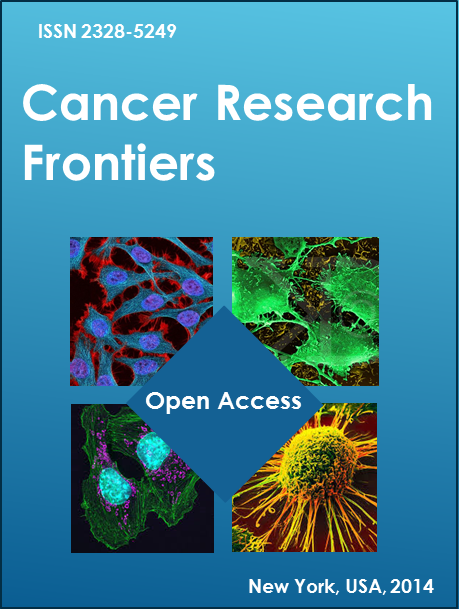Abstract _ Full Text (HTML) _ Full Text (PDF)
Review
Cancer Research Frontiers. 2016 Feb; 2(1): 1-21. doi: 10.17980/2016.1
Mechanistic roles of epithelial and immune cell signaling during the development of colitis-associated cancer
Renuka Subramaniam1, Atsushi Mizoguchi2, and Emiko Mizoguchi1, 2, 3
1Gastrointestinal Unit, Department of Medicine, Massachusetts General Hospital and Harvard Medical School, Boston, MA, USA;
2Department of Immunology, Kurume University School of Medicine, Kurume, Fukuoka, Japan;
3Center for the Study of Inflammatory Bowel Disease, Massachusetts General Hospital and Harvard Medical School, Boston, MA, USA.
*Corresponding author: Emiko Mizoguchi, M.D., Ph.D. Massachusetts General Hospital, GRJ 825D, 55 Fruit Street, Boston, MA 02114, USA. Fax: (617) 726-3673; E-mail:
Citation: Renuka Subramaniam, et al. Mechanistic roles of epithelial and immune cell signaling during the development of colitis-associated cancer. Cancer Research Frontiers. 2016 Feb; 2(1): 1-21. doi: 10.17980/2016.1
Copyright: @ 2016 Renuka Subramaniam, et al. This is an open-access article distributed under the terms of the Creative Commons Attribution License, which permits unrestricted use, distribution, and reproduction in any medium, provided the original author and source are credited.
Competing Interests: The authors declare that there are no competing interests.
Received Oct 30, 2015; Revised Jan 4, 2016; Accepted Jan 10, 2016. Published Jan 21, 2016
Abstract
To date, substantial evidence has shown a significant association between inflammatory bowel diseases (IBD) and development of colitis-associated cancer (CAC). The incidence/prevalence of IBD is higher in western countries including the US, Australia, and the UK. Although CAC development is generally characterized by stepwise accumulation of genetic as well as epigenetic changes, precise mechanisms of how chronic inflammation leads to the development of CAC are largely unknown. Preceding intestinal inflammation is one of the major influential factors for CAC tumorigenesis. Mucosal immune responses including activation of aberrant signaling pathways both in innate and adaptive immune cells play a pivotal role in CAC. Tumor progression and metastasis are shaped by a tightly controlled tumor microenvironment which is orchestrated by several immune cells and stromal cells including macrophages, neutrophils, dendritic cells, myeloid derived suppressor cells, T cells, and myofibroblasts. In this article, we will discuss the contributing factors of epithelial as well as immune cell signaling in initiation of CAC tumorigenesis and mucosal immune regulatory factors in the colonic tumor microenvironment. In depth understanding of these factors is necessary to develop novel anti-inflammatory and anti-cancer therapies for CAC in the near future.
Keywords: Colitis-associated cancer, Sporadic colon cancer, Intestinal epithelial cells, Mucosal immunity, Tumor microenvironment, and Signaling molecules.








